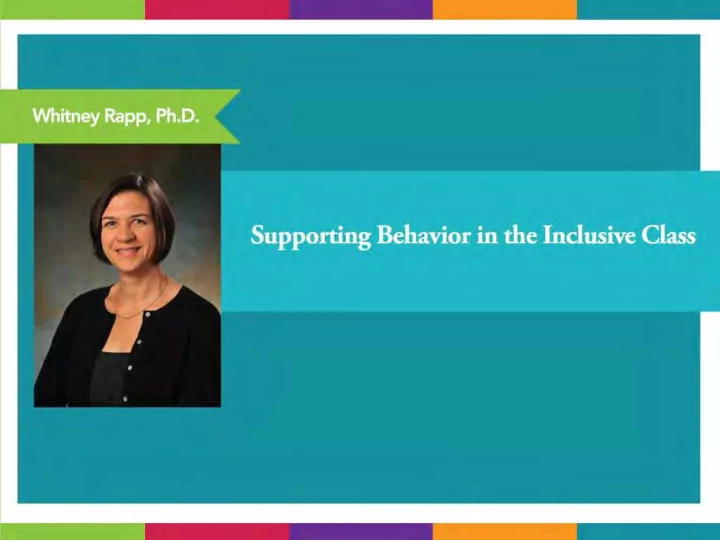

Foundational Ideas • Everyone needs support for behavior. • Behavior is communication. • Punishment doesn’t work. • Respond to the root of the behavior, not the surface.
Positive Behavioral Interventions & Support Intensive Supports Moderate supports Proactive supports
Proactive Supports • For all students all of the time • Building Community • Universal Design for Learning • Culturally Responsive Teaching • The Responsive Classroom https://www.responsiveclassroom.org/ Proactive Supports
Toolkit for Proactive Supports • Class meetings – Belonging, empowerment, and capability – Everyone participates! Kriete, R. (2002). The morning meeting book. Turner Falls, MA: Northeast Foundation for Children, Inc. Nelson, J., Lott, L., & Glenn, H. S. (2000). Positive discipline in the classroom: Developing mutual respect, cooperation, and responsibility in your classroom (3 rd ed.). New York: Three Rivers Press.
Toolkit for Proactive Supports • Fidget Toys – Enhances learning experiences – Provides sensory stimulation – Focuses attention
Toolkit for Proactive Supports • Cue signals – Individualized or whole-class – Visual or auditory – Supports all students in remembering classroom routines
Toolkit for Proactive Supports • Nooks – Alternative place to read or work – A place to decompress or think things through – Stock with paper, clipboards, books, seating, and fidget toys
Toolkit for Proactive Supports • Syn-naps – Periodic rests to replenish neurotransmitters and allow for more information processing – One to two minutes every 15 minutes – Stretch, dance, chat, sing, get a new fidget, etc. – Reconnect and keep going
Toolkit for Proactive Supports • CHOICE! – Benefits are prevalent in research – Offer options with common set of criteria – Examples: • Draw it, Write it, Say it, Move it • Homework Menus
Moderate Supports • Additional needs for some students • May be short-term or long-term • Classroom teacher (usually) Moderate Supports
Toolkit for Moderate Supports • Response scales – A concrete way to directly teach social skills – Increase self-management and emotional regulation Buron, K. D., & Curtis, M. (2012). The incredible 5-point scale (2 nd ed.). Shawnee Mission, KS: Autism Asperger Publishing Co.
Toolkit for Moderate Supports • Pre-questions – Provides extra time to answer discussion questions – Relieves anxiety – Builds confidence and self-efficacy
Toolkit for Moderate Supports • Social skill slam book – Provides peer-to-peer social advice and guidance – Use photos and speech bubbles to add support Kluth, P., & Danaher, S. (2014). From text maps to memory caps: 100 more ways to differentiate instruction in K-12 inclusive classrooms. Baltimore, MD: Paul H. Brookes Publishing Co.
Toolkit for Moderate Supports • Social stories – Direct instruction of meaningful social skills – For one-time events or long-term routines and situations Gray, C. (2010). The new social story book . Arlington, TX: Future Horizons.
Intensive Supports • Significant needs for few students • Usually long-term • Collaboration with related service professionals Intensive Supports
Toolkit for Intensive Supports • Alternatives to restraint and seclusion Life Space Crisis Intervention http://www.lsci.org/ – Interactive therapeutic strategy for turning crisis situations into learning opportunities – Non-physical intervention for behavior management and problem solving
Toolkit for Intensive Supports • Collaboration with Occupational Therapist The American Occupational Therapy Association, Inc. (AOTA) http://www.aota.org/ – Interventions to support full participation in the classroom environment and social situations – Therapies to develop motor skills, sensory processing, social coping, functional life skills
Toolkit for Intensive Supports • Augmentative and alternative communication American Speech-Language-Hearing Association (ASHA) http://www.asha.org/ – Symbol sets and systems – Eye gaze systems – Text-to-speech – Voice output aids
Additional Resources • Kluth, P., & Danaher, S. (2010). From tutor scripts to talking sticks: 100 ways to differentiate instruction in K-12 inclusive classrooms. Baltimore, MD: Paul H. Brookes Publishing Co. • Kohn, A. (2006). Beyond discipline: From compliance to community (2 nd ed.). Alexandria, VA: ASCD. • OSEP Technical Assistance Center. (2014). Positive Behavioral Interventions and Support. Retrieved at http://www.pbis.org
Additional Resources • Myles, B. S., Trautman, M. L., & Schelvan, R. L. (2004). The hidden curriculum: Practical solutions for understanding unstated rules in social situations. Shawnee Mission, KS: Autism Asperger Publishing Co. • Sapon-Shevin, M. (2010). Because we can change the world: A practical guide to building cooperative, inclusive classroom communities (2 nd ed.). Thousand Oaks, CA: Corwin Press. • Willis, J. (2006). Research-based strategies to ignite student learning. Alexandria, VA: ASCD.
Recommend
More recommend